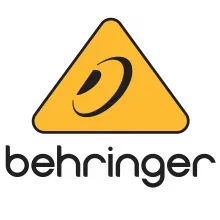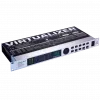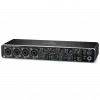
Behringer is an audio equipment company founded by Uli Behringer in 1989, in Willich, Germany. Behringer was listed as the 14th largest manufacturer of music products in 2007. Behringer is a currently a multi-national group of companies, with direct marketing presence in 10 countries or territories and a sales network in over 130 countries around the world. The products are made in "Behringer City", a wholly-owned and vertically-integrated plant in the People's Republic of China.
The company is owned by Music Group, a holding company chaired by Uli Behringer, which also owns other audio companies such as Midas, Klark Teknik and Bugera, as well as Electronic Manufacturing Services company Eurotec.
1989–2001: Foundation and early development
Uli Behringer, the company's founder, was committed to music and technology from a very early age, and had constructed a synthesizer (the UB-1) by the age of 16.
The UB-1 synthesizer
While studying sound engineering and classical piano at the Robert Schumann conservatory in Düsseldorf, Behringer found the university had limited equipment for student use, so he started to build his own products. His fellow students requested equipment from him too, and soon he was receiving more orders than he could handle himself, leading to the creation of Behringer Inc. In the early days, Behringer focused on studio audio processors such as noise reduction systems and compressors, but the product line soon included guitar amps, PA amplifiers and loudspeakers, mixing boards, stompboxes, recording interfaces, microphones, digital pianos, guitars, lighting equipment, etc. The appeal of Behringer's products was the package of performance versus low price.
While Behringer products were manufactured in Willich, Germany, many of the individual components were imported from mainland China. In 1990, to lower production costs, Behringer shifted production from West Germany to mainland China. Initially, subcontractors were engaged to produce the equipment. By 1997, Uli Behringer had relocated to Hong Kong in an effort to supervise manufacturing quality and to better understand Chinese culture.
According to Uli Behringer his piano teacher, impressed with his sense of perfect pitch, nicknamed him "The Ear," the inspiration for the Behringer Ear logo. The highlighted "ING" stands for "diploma engineer," or the German academic title "Dipl.-Ing," which he received upon his graduation from the University of Düsseldorf.
The logo was updated to the current logo on September 2010.
CoolAudio acquisition
In May 2000, Behringer acquired the rights to the entire CoolAudio technology from Intersil Corporation, a US-based semi-conductor manufacturer. CoolAudio is a high-power Class-D "digital" amplification technology with power ratings up to 4,000 Watts and efficiencies up to 90% which has been rated high audio quality. The acquisition included an extensive intellectual property portfolio and licensees such as Alpine and Rowe, among others.
2002–2007: Behringer City
In 2002, Behringer completed its own factory, Behringer City, in Zhongshan of China's Guangdong province after it consolidated more than ten separate production locations into one vertically integrated plant. Comprising eight buildings that produces electronics, speakers, guitars and digital pianos and also hosts an onsite health clinic. This strategy was different than that taken by other musical instrument companies who used third party manufacturers. Choosing to run a self-contained plant allowed Behringer a greater level of quality control. The 1,200,000-square-foot (110,000 m2) manufacturing complex in Zhongshan ships more than 2.5 million Behringer products per year to markets around the globe. The plant turns out over 50,000 mixers per month with a failure rate that is less than 0.1%. There is a waiting list of those wishing to be employed at Behringer City.
Recent developments
FCC dispute
In February 2006, the US Federal Communications Commission (FCC) fined Behringer $1M, issuing a Notice of Apparent Liability against Behringer, claiming that 50 of the company's products had not been tested for conducted and radiated emissions limits as required by US law, and noting that Behringer continued to sell the products for a year after being notified. Behringer had believed that since the units had passed stringent European CE standards, they would also comply with FCC verification requirements. According to Behringer, it had overlooked the differences in testing standards and procedures under FCC and European requirements and has since implemented a complete UL certified safety and EMC testing laboratory under the UL certified witness program, including an in-house audit and global regulatory review system.
Legal cases
In June 1997, Mackie accused Behringer of trademark and trade dress infringement, and brought suit seeking $327M in damages but such claims were later rejected by the court. In their suit, Mackie said that Behringer had a history of copying products by other manufacturers and selling them as their own. The Mackie suit detailed an instance in which Behringer was sued by Aphex Systems for copying the Aural Exciter Type F—in that case Aphex Systems won 690,000 Deutsche Marks. The Mackie suit also mentioned similar cases filed by BBE, dbx and Drawmer. On November 30, 1999, the U.S. District Court in Seattle, Washington, dismissed Mackie claims that Behringer had infringed on Mackie copyrights with its MX 8000 mixer, noting that circuit board layout was not covered by U.S. copyright laws.
In 2005, Roland Corporation sued to enforce Roland's trade dress, trademark, and other intellectual property rights with regard to Behringer's recently released guitar pedals. The two companies came to a confidential settlement in 2006 after Behringer changed their designs.
Present direction
"Double the features, half the price," served as Behringer's mantra for many years, but Behringer is now distancing itself from this approach. Current manufacturing priorities focus on ease of user interface and build quality. Today, Behringer has business presence in 10 countries and territories around the world. With these points of presence and an international network of distributors and dealers, Behringer products are sold in more than 130 countries.
Behringer University
Inspired by lean manufacturing, and driven by the Kaizen philosophy of continual improvement, Behringer makes efforts to help its employees to improve. "Behringer University" supplies employees with training resources and E-learning courses to hone their career skills within the company. This project includes classes for management, career planning, health, language, and general knowledge.





